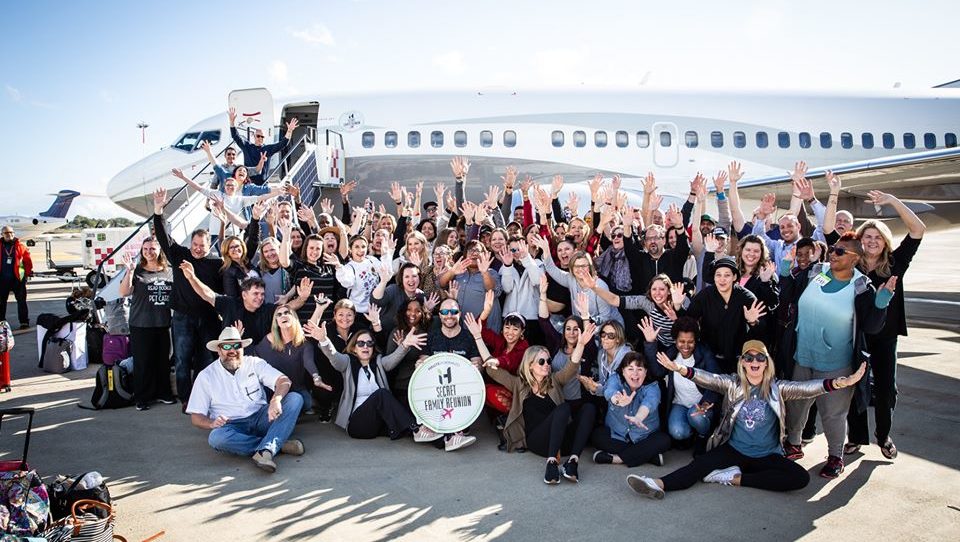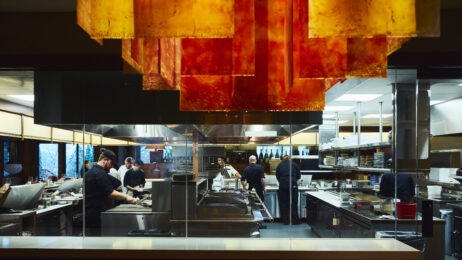Haute Dokimazo (HD), an event industry startup dedicated to improving meeting, sharing and learning by staging spontaneous think tanks, hosted its first Secret Family Reunion (SFR) in early November. Eighty event prof registrants who had all attended previous HD experiences signed up for the all-inclusive voyage with no clues to location other than to bring their passport and items from a packing checklist.
A pre-flight reveal party at TWA Hotel at JFK in New York City popped the cork on the hidden itinerary—Tuscany, Italy. Attendees then boarded a privately chartered 737 which conveyed them by way of in-air dance party (with conga lines), fostering camaraderie and ultimately providing for the group comfort that Haute Dokimazo says is the key to its efficacious think tanks.
The trip itself breaks the mold of destination travel for business—the voyage was a vacation and a conference in one, where participant’s professional obstacles and ideas set the agenda.
Smart Meetings chatted with president and co-founder Nicole Osibodu and co-founder Liz Lathan to find out more about HD’s particular unconference philosophy.
HD Comes into Focus
The revolution started a few years ago when Osibodu, Lathan and fellow co-founder Tom Spano were at a conference, deep into an amazing conversation in the hallway when the xylophone usher came to steer them into the presentation. “We were in a deep moment, and we told them we’d be in in a minute. And they said ‘But it’s kind of light [empty] in there.’ And I was thinking, really? Everything that’s wrong with events just happened right now. Well, ok—not everything.”
Not everything, because there were other aspects of conferences that Lathan wanted to change. “What’s the worst part of a conference? Registration,” she said, answering her own question. “You get in line and then get your badge and then everyone goes off and sits in a corner on their phone, hoping to see someone they know. I had always wanted to do a different kind of registration.”
Their collective experiences birthed HD’s focus on making an event, well, a collective experience. HD’s signature “welcome attack” starts with greeting attendees with a hug or a handshake, taking the impersonal rote-ness out of proceedings. The event begins with a family meal, where you’ll be introduced to others at your table. With the icebreaking done for you, you’re in your human element right off the bat.
This is important because, besides being much more enjoyable, the content of the event is crowdsourced from the real-life questions and challenges of the attendants. Topics are sorted and focused, and attendees with expertise offer to be facilitators. The magic of HD, according to the live feedback following each event, is its organic nature and the freedom participants feel to dig into problems and raise questions. Osibodu offered up some HD philosophy: “The first thing we remove is motive. We have no hidden agenda behind this movement: we simply want more events to focus on people more. People go to events to learn, meet, share, network and take something back to their job or their life that is immediately actionable. Peer-to-peer is our core. This means humans are our core. So, we strip away the fake fun and surface-level connections and get straight to the human conversation that helps participants solve problems.”
Room for Everyone
Osibodu explained that HD isn’t trying to throw the entire conference concept out the window. “We knew there needed to be something else. Not a replacement, but a supplement.” The unconference model isn’t brand new. Forbes wrote about its potential for sparking innovation back in 2014. The HD difference is a vibe, an openness to further expansion, and an atmosphere that results in genuine human connection.
The in-flight glow-in-the-dark party at SFR, for instance, was staged “purely because it is ridiculously awesome” according to Osibodu. But also, “We believe that memorable moments cement learnings. Our surprise and delight elements all focus around an emotional response that is shared with the people surrounding when it happens. Deeper connections are made around a sloth and a lemur than you’d ever imagine.”
Relationships are not just a platitude—SFR participants started a Whatsapp chat during the trip that lived on and looks just like your friends group text—pictures of seats in coach lamenting the lack of glow sticks, best wishes when someone’s not feeling too hot, and plans to get together (that get followed through). Osibodu told me that even though there are no facilitations for this at the event, as no selling is allowed, that participants have shared with her the business transactions that resulted from the event. “It just happens naturally. They make a genuine connection, and then find they have needs each other can fill.”
An Anthology of Events
Plans for the next SFR are already in the works and the two say it will be completely different, not just a change of destination. Osibodu said: “We know that we can never recapture the magic of that experience, and we didn’t do it to create yet another event for the industry. We did it to open minds, push boundaries and show that human connection is required for businesses to flourish. We are more digitally connected and humanly disconnected than ever before, so we believe bringing people together for analog serendipity will outlast technology.”
Lathan compared the experience to the television show Survivor’s same-old content in new locations. “You know how the first season was so exciting, and then by the 3rd or 4th season it’s kind of boring? We want every season to be as exciting as the first season.”




